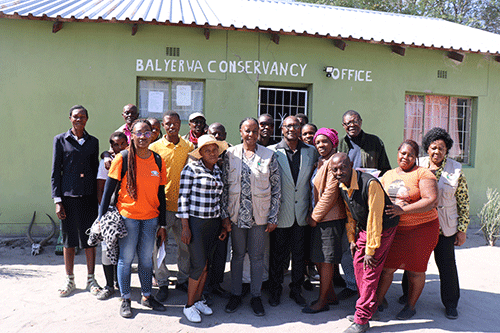George Sanzila
KATIMA MULILO - The Balyerwa conservancy, registered in 2006 and found in Zambezi region, has been making steady progress in empowering community members living in the areas of Mbambazi, Sauzuo, Nambali and Lyanshulu, which fall under the conservancy.
This information was revealed to the sub-committee of the Parliamentary Standing Committee on Natural Resources, which is currently visiting the region to gauge progress made by conservancies under the Community Based Natural Resources Management (CBNRM) programme that has empowered rural communities to conserve and manage their own natural resources in order to improve their livelihood.
According to chairperson of the conservancy, Knox Salushando, the conservancy that employs over 24 staff members drawn from the local community, generated revenue of over N$3 million last year and has been making concerted efforts to improve the livelihood of people in the area, despite experiencing a reduction in the allocation of the hunting quotas.
“We have been contributing money amounting to over N$300 000 for the construction of the chief’s palace and we have sponsored students with a total amount of N$30 000 and also supporting our five sub Khutas and our local churches,” stated Salushando.
He noted that the conservancy has further embarked on projects such as assisting community members with easy access to the water pipeline and electrifying villages.
“We have initiated some projects that are meant to assist our community members. So far, we have bought water pipes to connect villages that are far away from the main water pipeline. We have managed to install water points at Nambali and Sauzuo. We have also started assisting villages to have access to electricity. A budget of over N$1.5 million for this initiative has already been set aside and a contractor identified.
“For now, we are targeting areas such as Sauzuo, Nambali and Lyanshulu. We hope to complete this project by the end of this year,” he said.
He further revealed that as part of efforts to derive maximum benefits from the management of natural resources, the conservancy has successfully managed to negotiate for a 15% increase in the price of hunting quotas, with the identified professional hunter having further agreed to sponsor a total amount of N$750 000 towards the development of the area and assisting in the setting up of a campsite, craft centre, traditional village, community hostel and a clinic.
Despite the successes, the interference of the traditional authorities in the affairs of conservancies in the region was identified as a major challenge that continues to threaten progress.
“We have had challenges with some families who reside in the area but pay their allegiances to different traditional authorities, being sidelined by the traditional authority. These incidences are common in the region even though our constitution clearly stipulates that a community member may only stop to become a member when they die, resign or migrate to other areas and not tribal affiliation,” bemoaned Salushando.
Plans to set up a 2 000-hectare green scheme in the Lyanshulu area close to the Mudumu National Park, are also seen as a major impediment to conservation efforts by the conservancy.
“There are plans to set up a green scheme close to the entrance of the Mudumu National Park. The de-bushing exercise in this area is likely to scare away our wildlife as the conservancy is bordered by both Mudumu and Nkasa Rupara National Parks that are feeding our conservancy with animals,” decried Salushando.
Over-fishing seems to be another major concern that has adversely affected the operations of the conservancy, with Salushando noting that the area has become a hotbed for illegal fishing by foreign nationals mainly from Zambia and Angola, who are also said to be employing illegal fishing methods.
“These foreigners are setting up camps for more than six months. They bribe local people who apply for fishing permits on their behalf and use prohibited monofilament nets to catch fish. We have reported this to the authorities many times but we are often told that there is no transport,” said Salushando.
Other challenges included human-wildlife conflict, with the conservancy currently processing over 50 claims for last year alone.
Poaching is also another challenge.
Members of parliament Agnes Kafula, Mike Venaani, Annakleta Thikerete and Tangeni Ijambo were all impressed with the progress made, adding that there was a need to encourage peer learning among the conservancies, in order for others to emulate the good examples.
At the Bamunu conservancy, neighbouring Balyerwa, similar projects such as assisting villages with electrification and provision of farming implements are being undertaken. The conservancy stated that human-wildlife conflict is rampant in the area and that it was difficult to convince community members about the importance of conservation when their fields are being destroyed by wild animals with little compensation. They appealed for a review of the compensation policy.
Community members who settle in animal core areas of the conservancy have also become a hindrance to conservation efforts.
The Mashi conservancy, one of the oldest conservancies in the Zambezi region, is ploughing back into the communities of Sachona, Lubuta, Namushasha and Lizauli who fall under the conservancy, over 50% of revenue generated from its activities. Over 100 villages have benefited from electrification and water provision initiatives with the conservancy having spent over N$1 million to that effect. The conservancy which has also built classroom blocks and a community hostel, further provides assistance to students from impoverished families who intend to further their studies and provides funeral covers for conservancy members.
*George Sanzila works in the Division: Research, Information, Publications and Editorial Services*


